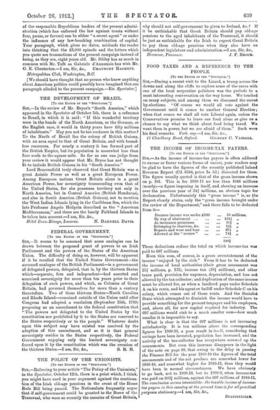FEDERAL GOVERNMENT.
[To THE EDITOR Os THE "SPECTATOR."] SIB,,--It seems to be assumed that some analogies can be drawn between the proposed grant of powers to an Irish Parliament and the powers of the States of the American Union. The difficulty of doing so, however, will be apparent if it be recalled that the United States Government—the assumed analogue of the British Parliament—is a. government of delegated powers, delegated, that is, by the thirteen States which—separate, free and independent—had asserted and exercised sovereignty for more than ten years prior to their delegation of such powers, and which, as Colonies of Great Britain, had governed themselves for more than a century theretofore. Two of these thirteen States—North Carolina and Rhode Island—remained outside of the Union until after Congress had adopted a resolution (September 25th, 1789) proposing as an amendment to the federal constitution that " The powers not delegated to the United States by the constitution nor prohibited by it to the States are reserved to the States respectively or to the people." Whatever doubt upon this subject may have existed was resolved by the adoption of this amendment, and so it is that general sovereignty resides in the States respectively, the Federal Government enjoying only the limited sovereignty con- ferred upon it by the constitution which was the creation of
the thirteen States.—I am, Sir, &c., S. R. H.


















































 Previous page
Previous page